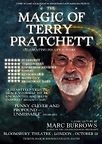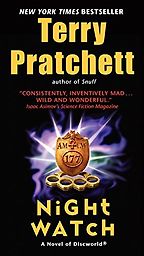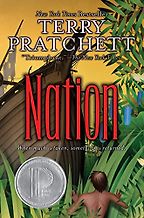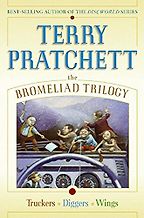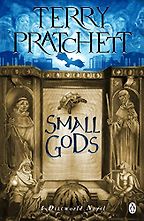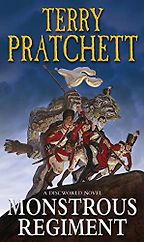Terry Pratchett’s books have been translated into forty different languages and have sold more than 100 million copies. Why is he so popular?
That’s a big question. There are some obvious answers: first, he is very funny. Every single book, from the word go, is very funny. But I don’t think it’s just about being funny although that’s an important part of it.
The appeal of Pratchett’s writing is that it’s completely human, in a way that belies the fact that it’s about goblins and dwarves and trolls and tiny blue pixies and all that stuff. All of those characters are completely human and have been from the start.
Now, the first book—or really, the first Discworld book, The Colour of Magic, which was actually his fourth book—hasn’t aged spectacularly. It is a novel that needs a certain amount of context to understand the jokes about nerdy 1970s fantasy. But the book still works because the main character, Rincewind, is brilliant and he’s still a completely relatable character. He’s somebody who is frustrated by the sheer unfairness of the universe, and that’s something I think most people have felt at some time. Every Pratchett book has something like that: something that links it to the human experience.
I always say that 41 of Pratchett’s 60 books were set on a flat world, on the back of four elephants, on the back of a giant turtle, is the least important thing. They’re about human experience, how we think and feel, what we believe. They’re stories that we use to explain who we are, and the stories imposed on us by other people, and the tension between the stories told by ourselves and the stories we were given. That’s at the heart of all of his work.
I remember when my mum first gave me a Terry Pratchett book, when I was 12. She was almost trying to justify the fact that she’d read a fantasy novel: ‘These aren’t, like, hobbits. They’re the kind of people you’d meet down the pub.’ That’s why they worked then, it’s why they still work. That’s the power of his writing.
Right. You mentioned the Discworld series, which he is best known for. The books are set in the same fictional universe, but centre on many different characters. Can you read the Discworld books in any order?
More or less. I would always recommend not starting at the beginning. I mentioned The Colour of Magic—that book has dated. Also, because Pratchett was so astonishingly prolific (publishing two books a year, for much of his life) he got so much better as time went on. The more you do something, the better you get, right? By the time he wrote Mort in 1987, he was ten times the writer he was when he wrote The Colour of Magic in 1983. So, once you’re a fan, go back and read the first three books later.
But there is a problem with the later books, which is when he really comes into his own as a writer, in that he does tend to assume a bit of knowledge. After twenty or so books, I think he felt he didn’t have to keep explaining the Discworld every single time. So: between book four and book 20, you can pick up pretty much any of them at random and they will all work.
If you really want the experience of watching him develop, I’d say: start with Mort and read in publication order after that. You’ll see him coming into his own. They start as funny books—which are good and interesting and witty, with plots like clockwork—but over time they become profound. And that slowly moves in across the series.
A lot of people are intimidated by Terry Pratchett: there are sixty books—how do I know which one to start with? Mostly, I’d say, you can pick up any book and it will work. But I like to help match people to books, because he draws from many different genres: if you are a fan of Gothic vampire fiction, say, you should start with Carpe Jugulum; if you like crime thrillers, the Guards books—Guards! Guards!, Men at Arms, and so on—are police procedurals; if you like Shakespeare, Wyrd Sisters and Lords and Ladies are Shakespeare parodies; if you like darker, more politicised thrillers, you’ll enjoy Monstrous Regiment or Night Watch. The Tiffany Aching series is YA fantasy. Whatever your thing, there is a Terry Pratchett book for you.
I love that, thanks. And the first title you’ve chosen to highlight in this list of Terry Pratchett’s best books is Night Watch, which you just described as one of the darker thrillers. It was the 29th Discworld book and was published in 2002.
Yes. Night Watch is also one of the Guards books—that’s his series of police procedurals which began with Guards! Guards! in 1989. That book introduces the character of Sam Vimes, who shouldn’t really be the hero; that should be the character Carrot, a young man who was raised by dwarves in the mountains, who has obviously got a mysterious destiny, a magic sword, all that. What Pratchett does, which is his genius, is that he brings that character in, but makes him a secondary character. That mysterious destiny just never manifests. What that does is that it leaves a hole in the story that pulls in other characters, including this character Sam Vimes, the captain of the Night Watch, who is a cynical, alcoholic curmudgeon, but also as it turns out a great detective and someone with a really well-honed sense of right and wrong, and fury at injustice.
That starts in Guards! Guards! and the character grows massively through the series in a way that mirrored Pratchett’s own life—although Vimes got there first. In the books, Vimes ends up one of the richest and most powerful men in the city, becomes Sir Samuel Vimes, later becomes a duke. Pratchett also became massively wealthy and was knighted. So it’s a great example of life imitating art.
There was a purple patch of Terry’s writing, from 2001 onwards, before the Alzheimer’s began to take the edge off his writing, sadly. There was a period, though, where he was completely unstoppable: masterpiece after masterpiece after masterpiece. And that really started with Night Watch.
“There was a period where he was completely unstoppable: masterpiece after masterpiece after masterpiece”
Night Watch is a story about morality. In it, Vimes finds himself zapped thirty years back into the past, and cast in the role of his own mentor. He knows that his mentor dies in a tragic, failed revolution—so he already knows that is going to happen. So this means that Pratchett gets to play with all these ideas of revolution. There’s a lot of Les Misérables in there, a lot of waving flags on the barricades. But there’s also talk about why revolutions are called revolutions—because another one will come along later. And about who it’s for: it’s for the people, but who are the people, and why would you trust them? It’s very cynical and very wise. And it has this ticking clock at the heart, because you know he must die at the end of the story, and he must impart all his advice to his younger self, whilst also—crucially—catching the murderer that he originally went back in time to find. So there’s a nice bit of Terminator in there as well, a time travel parody.
It’s an incredibly vivid, visceral book. It’s probably the darkest of his books, and one of the few that are legitimately thrillers. Plus, even with all of this going on, he always finds time to be funny. If you asked a lot of Terry Pratchett fans what their favourite Terry Pratchett book was, if they didn’t have Night Watch at number one, it would certainly be in their top five. It’s an extraordinary book, and one that I always return to.
Great recommendation, thanks. It seems to me that in order to pull this off—satirising, parodying, or reworking devices from all these different genres—he must have been very widely read.
He was incredibly widely read. The only person who gets every joke in a Terry Pratchett book is Terry Pratchett. Because there are just so many. He discovered the joy of reading as a child and was obsessed with the library. First he read all the books about space and astronomy at Beaconsfield library in Buckinghamshire, England. Then he moved into science fiction, which led to fantasy, which led into mythology and history… Soon he was reading, like, Henry Mayhew’s London Labour and the London Poor alongside the Moomins alongside Dickens.
He got hold of every copy of Punch magazine in a secondhand bookshop, going back to the 19th century, and read them all cover to cover. He was an absolute sponge for trivia. He was always learning.
The Discworld came about in a really roundabout way. He was writing a science fiction book called Strata in the late 1970s, which is about alien artifacts. It’s a kind of parody of Larry Niven’s Ringworld, a ring-shaped world that goes around the sun. But he thought: okay, what if it’s not a ring, but a flat world, a disc. That’s mythology. So I could populate that flat world with mythological creatures. That was the original idea.
Then he remembered something he read once about Hindu mythology and the ‘world turtle’. So he was taking one idea from science fiction books, one idea from mythology, and channelling the real world through it. He was a widely read polymath who knew so much, and was quite indiscriminate: he knew Shakespeare, he knew Dickens, he knew physics and maths, but he also loved Alien and musicals. So you have all these references, which is one of the reasons that the books work so well: one set of people get one layer of jokes, another set get a different, totally different, layer of jokes. And one group will never notice the other jokes are even there.
Let’s talk about the second Terry Pratchett book you’ve chosen to highlight as one of his best. This is Nation, an alternative history published in 2008 that exists outside of the Discworld sequence.
Nation was inspired by the Krakatoa explosion of the 19th century, which caused a huge tsunami that killed thousands of people in the Pacific islands. Terry started writing it in 2004, but abandoned the project after the 2004 Boxing Day tsunami. He put it away, then—after his Alzheimer’s diagnosis in late 2007—when he didn’t know how long he had left, how many more books he was going to be able to write, the first thing he did was clear everything to finish Nation, in case it was the last book he ever got to write. This was a story that was incredibly important to him.
Nation is set in an alternative Victorian society in which a huge explosive volcano, then a tsunami, has wiped out all these Pacific tribes. And it’s about one boy, who has gone off to do a ritual that makes him a man; when he gets home, everybody else is dead. So it’s a tale of a young man raising his hands to the sky and shaking his fist at the gods and asking: Why did you allow this to happen?
Then other people start to come to the island. There’s a shipwreck, and the only survivor is a minor English royal. They form a bond, and learn to communicate. It is delightful, powerful, really funny story. It’s beautifully put together. It’s a wonderful book. I think Terry would say it was his best book, and I don’t disagree. If you come to Terry Pratchett expecting swords and hobbits and nerdy stuff, Nation is not that book. But it’s completely gorgeous.
It’s a young adult book, it’s easy to read. He wrote very well for children and young adults.
Your third recommendation, The Bromeliad—also sometimes known as the ‘Nome Trilogy,’ and made up of the novels Truckers, Diggers, and Wings—is also aimed towards children, I think?
Yes, I’ve cheated slightly because this is really three books. But you can buy them as a companion edition, and I believe that in the US they were only ever published as a single volume. So I’m claiming it.
Fair enough.
Truckers was the first time Terry stepped away from the Discworld after becoming successful. He’d always been a children’s writer—his first book, The Carpet People, was a children’s book, and prior to that he’d been writing short stories for children for the local newspaper he worked for. At the age of 17, he got a job at a local newspaper. It had a children’s column that no one wanted to write; they considered it a pain in the ass, the worst job there. So Terry took it on.
All the columns were collectively written under the pseudonym ‘Uncle Jim.’ But he took it on and wrote really wonderful short stories aimed at quite young children. They’re very Roald Dahl. He’d hate the word ‘wacky’, but it does kind of apply to those stories. But they are lovely children’s stories. And through that period he was writing the Carpet People book. So he’d always considered himself a children’s writer as well as a writer for adults. The Discworld is aimed at adults, but I think if you were 12 you could pick it up and read it.
Once he got so famous he could basically do what he wanted, his first instinct was to write a children’s book. And the plot for Truckers actually comes out of those short stories he was writing in the 1960s and 1970s. It’s the story of a group of tiny gnomes who live in a roadside café. For various reasons, their food supplies are drying up, the hunting is bad. Almost all of them have died out; there are only around five of them left. So they decide to stowaway on the back of a truck and see where it takes them. It takes them to a department store, where they find an entire civilisation of gnomes living under the floorboards of the department store—and these gnomes don’t believe the universe exists outside of the story.
“People always go to the Discworld first, but I’d say The Bromeliad is as intrinsically Terry Pratchett as you get”
They think the story is everything, and have constructed a religion around it based around signs saying things like ‘Everything under one roof’ and ‘If you require help, please ask.’ They’ve made the founder of the store a kind of god-figure, and the store is their religion… then this group of outsiders drops in. It’s a very Pratchett idea, this.
Then they find out that the store is going to be destroyed, and they have to convince all these other gnomes to leave the store, go out into a world they previously didn’t believe existed, and to put aside their religion. That’s the first book. What happens next, and where they end up is the second two books in the trilogy. The reason it’s called the ‘Bromeliad’ is that there’s a bit in the second book, Diggers, where Pratchett talks about a character who, as she learns to read, reads every book she can get her hands on. She discovers bromeliad flowers, which bloom high up in rainforests. Within the petals are little pools and in those pools live tiny frogs. Those frogs live their whole lives in a flower not knowing that a world exists outside of that flower. And he has this beautiful analogy of the frog that looks up, over the petals, and sees the forest in front of him.
Yeah, it’s not a subtle metaphor. But the entire series is about this idea that the world is always so much bigger than we think it is, there is so much to explore and to discover. And the more we wrap ourselves in ideas—particularly around religion, but all sorts of societal norms that constrain us—the more we are stopped from being able to see how much more we can get out of our existence. That, again, is a very Pratchett theme that comes up again and again.
These are wonderful books. They’re aimed at children, so you can read them at ten, but you could read them as an adult and they still work really well. Terry never really saw a difference between children’s and adult fiction, except that you might not use the slightly longer words and you would make sure your themes were a bit more clearly laid out. But, essentially, a story is a story.
People always go to the Discworld first, but I’d say The Bromeliad is as intrinsically Terry Pratchett as you get.
The next Terry Pratchett book we are going to discuss, Small Gods, is also a satire of religion. Was he an outspoken atheist?
He was, yes, although he wasn’t an atheist in the Dawkins sense. He wasn’t somebody who went out and campaigned, for he always said he was quite fond of the Church of England in the way it represented the English character. He contributed towards the repair of the local church roof in his village. So he understood the role that the church played in community, but he awlways saw a difference between that small scale thing—having something comforting to believe in—and the huge systems that control people. He described himself as a humanist, and was a member of the Humanist Society and had a humanist funeral. But he was always clear that the ‘beard in the sky’ was a distraction. Whatever else affected our lives, it wasn’t that.
Small Gods is about how pure faith can be warped by fundamentalism and dogma. How powerful people use religion to control people who don’t have power. It’s the first of the Discworld books that really has something to say. It’s very disconnected from the other Discworld narratives.
There’s a wonderful, typically Pratchett-y twist in that, in this religion, they believe the world is round—a reversal of classic Flat Earth-dogma, because they do live in a flat world but their religion insists that the world is round and tries to stamp out the movement of people who correctly assert that it’s a flat planet on the back of elephants on the back of a turtle.
Five Books interviews are expensive to produce. If you're enjoying this interview, please support us by donating a small amount.
It’s about a character who hears the voice of God, but the voice of God comes from a tortoise, because the god tried to turn himself into a flaming ball to visit somebody, and realised that he had no power because no one truly believed in him—all he could manage was to be a tortoise. There is only one person in the entire world who believes in him. This brings the power of faith and the power of belief into the Discworld books; that is, if you believe in something, it happens, which is why things in this world tend to conform to stories, to what the story expects you to do. Force of belief creates a person, and then that person exists as a real person and becomes a character with thoughts and feelings—that’s another book, well, several other books.
Small Gods plays with this idea that religion controls us, and religion is controlled by powerful people who have no real interest in the good of mankind or in the wishes of their particular beard in the sky. All they are doing is using fear to control people. It’s not as down on religion as you might think. What it’s actually down on is dogma and fundamentalism. It’s actually very pro-faith. The main character, Brutha, is seen as a very pure and lovely thing. And once he understands he can move outside of the constraints of these rules and explore his faith in other ways, then that becomes something powerful and useful and worthy, not something controlling and bad.
The way Terry came up with this story is very Pratchett. He had just brought his own tortoise out of hibernation and wanted to write a book about a tortoise. He started to research tortoises and came upon an old Greek legend of how an eagle had dropped a tortoise on the head of a priest, who died. Well, Terry started thinking: it seems too much of a coincidence that, of all the rocky ground in Greece, the tortoise would happen to land on a person. It must have been on purpose. Okay, the tortoise was conscious and was in control of the eagle. Why would the tortoise want to kill somebody? Well, nobody hates priests more than God, so the tortoise must be a god. You can spot the point in the logic where other people wouldn’t have gone in this direction.
This was the first of his books that was really powerful. Before they had been clever and arch and delightful and funny and wise, but they hadn’t been powerful in the way Small Gods is powerful. It opens up another direction in how he thinks and writes.
I think that might lead us to Monstrous Regiment. This is the 31st Discworld book, published in 2003. Why is it one of Terry Pratchett’s best books?
Monstrous Regiment is a standalone Discworld book. The Discworld books often returned to the same characters—you know, there are books about witches, books about gods, the police procedurals, the books about Death (that is, the character Death not the concept of death)—but Monstrous Regiment stands totally alone. Originally it wasn’t going to be written as a Discworld novel, it was going to be set during the Peninsular Wars.
I don’t know if that was a marketing decision. He always said the Discworld novels sold as well as the other books, there was no real difference in sales. I don’t know how true that is. But I think in the end he realised he could do more in Discworld. By this point in the Discworld, it’s no longer a medieval swords and sorcery fantasy, it’s mostly set in the Victorian era. Monstrous Regiment is set in what is basically a war-torn eastern European country, more or less. They are fighting a war and losing, everyone has been conscripted, and it’s all very horrible.
A teenage girl disguises herself as a boy and goes off to war to find her brother. She joins a platoon, basically the dregs of whoever they have left. Most of them have died. So it becomes an exploration of the futility of war. He really goes there. And it’s also an exploration of gender, the boxes we get put in: how we are expected to behave if we are women or men. And, again, you have this theme of powerful people pushing other, less powerful, people around. In this case it’s generals and common soldiers, kings and pawns. It’s a very interesting book.
As I said, one of the themes in all his work is the stories we tell about ourselves, the way we explain our true selves and the stories we have forced on us. Gender roles are a good example of that, the stories forced on us. So this book is about somebody who tries to make their own story, and it’s a really good ripping yarn that has a lot of interesting stuff to say.
It’s a dark book. It kind of comes out of nowhere. It doesn’t really fit with any of the other Discworld books, although there are a couple of recurring characters that pop in. But you see them from another angle, as you are viewing them through the eyes of different characters. I think it could easily have been that book set during the Napoleonic Wars. It has those big hats, red hats on the battlefield. And although there is some really funny stuff in it—war movie cliches and Apocalypse Now references—it’s probably the least funny of his books, and the most serious. It’s really good, and it’s another one that I return to again and again.
“If you really want the experience of watching him develop, I’d say: start with Mort and read in publication order”
This also came out of that purple patch in his writing, where everything he was writing was amazing, where it had a lot to say. Another thing I like about Terry’s sense of morality and social justice is that, as he expands as a person, the work expands. And I think that’s a reflection of the world becoming more inclusive—we all float up with it. So, good example: there is an early Discworld book where he says that racism doesn’t exist on the Disc—because of all the different species. Black and white live in harmony, and gang up on green, right? But he realises quite quickly after that, that if you’re exploring the human experience you can’t not include racism. So, suddenly, there are books where there are racist ideas, and he explores racism in another book.
I mean, there’s very little sex in general in the Discworld. The relationships are all relatively cosy. There were no gay people in the Discworld books for a while, although there is a queer romance nestled in the background of Monstrous Regiment. Plus it deals with women dressed as men, although in the case of Polly, the main character, she’s dressing as a man to achieve a goal. But there are other characters whose gender identity is much more a part of their narrative, and they are doing it for different reasons. He explores it beautifully. A few years ago, somebody said that Terry Pratchett would be against trans rights, but they had obviously not read Monstrous Regiment, because this is a book about how the person you are is not the person you are told you are.
So it deals with those ideas, and then the futility of war. It’s not subtle, there are a lot of limbs in this book. Because it is war as it was in the 19th century, with cutlasses and sabers. It’s visceral and unpleasant.
It’s very different to a lot of his other work, and it is a book that you can just pick up. It’s not necessarily a starting point for Discworld, because it doesn’t link to any other Discworld books, but it’s a superb piece of writing.
Thanks. I think a standalone book is quite inviting to a reader who is new to Pratchett.
Could I add one more point? When he was writing, his editor said that she didn’t believe that a woman could dress up as a man and fool the other soldiers. She rejected the premise on the basis of it being too far-fetched that anyone could get away with it. So Terry did a lot of research in lesbian bookshops—he just loved reading—and discovered there were huge numbers of women who fought in the Napoleonic Wars, who fought in the American Civil War, the First World War… people who were only found out after they had died and their bodies were stripped. It is a real phenomenon. Women go to war for the same reasons that men go to war—they want to fight for their country, or they want to fight for something—and for other reasons too.
Absolutely. And I think this comes back to your earlier point, that these are very human books, drawn from or inspired by human history, even if they might be set on fantasy worlds. That brings us to the end of your list, but there are a couple of new Terry Pratchett-related books coming up in the near future that I thought we might touch on.
That’s right. There’s Tiffany Aching’s Guide to Being a Witch. This is not a novel, but a sort of spin-off, a companion to the YA Tiffany Aching books that Terry created towards the end of his life. It features a teenage witch.
That’s wonderful, because—early in his career—Terry was not great at writing women, and especially women in their prime. At the start of his career, he wrote some good young children (because he had a daughter) and some very vivid and well-written older ladies. But he took time to get young women right. Later there were five Tiffany Aching books in which she grows from eight to 17. He was made an honorary Brownie Guide for writing ‘a real girl.’ By this point, he’d seen his daughter grow up, he knew her friends, he understood young women better. He said that he never had to think about what she would do: he would just put her in a situation and she would tell him, and he would go along with it. I think she was basically his favourite character.
Tiffany Aching’s Guide to Being a Witch is written by Rhianna Pratchett, his daughter, and Gabrielle Kent, a children’s author. It’s beautifully illustrated and it’s aimed at young adults. Rhianna Pratchett is the only person authorised to write sequels to Terry’s work. More novels, I mean. He didn’t want what happened to Douglas Adams to happen to him—where somebody else wrote another book in his series. He always said, if Rhianna wants to write Discworld novels, she’s welcome to. But no one else. And she’s always said she’s not interested in writing new novels. Helping to develop films, writing spin-offs, playing in the world, yes. But not actual novels. So this is just a nice complement to the Tiffany Aching books for existing fans.
Terry always said that he didn’t want his work to be pillaged after he died. You know, there are something like 12 volumes of Tolkien’s unfinished stories. There’s a Douglas Adams book called The Salmon of Doubt, collecting half-finished bits and bobs, cut scenes, early drafts. So Terry had a strict rule, that his hard drive containing all his unfinished work would be crushed by steamroller after he died. Which really happened!
There is no new Terry Pratchett stuff that has never been published. But—it turns out—there were a bunch of stories that had already been finished and published that we didn’t know existed. I mentioned earlier that he worked as a journalist and as a sub-editor between 1965 and 1977, before he moved into working in PR. All that time he was writing these short children’s stories. The Uncle Jim stories dry up in the mid 1970s. But recently somebody found a new story with the Terry Pratchett byline published in the 1980s in the Western Daily Press. They got in touch with Terry’s agent, Colin Smith, who is kind of the keeper of the archive.
They said: I found this, I didn’t realise you didn’t know about it. But the problem was that they didn’t know when it had been published; it had been clipped out of the newspaper when they were a teenager, and they’d clipped the story but nothing else. So Colin dispatched two friends—both medical doctors, who had been involved in the fandom for years—to the British Library Newspaper Archive. They started in the 1980s and worked backwards, and as it turned out, it was published in 1984. But because they were diligent academics, they recorded every short children’s story published in the Western Daily Press in the 1970s and 1980s, and they came across a story called ‘The Blackbury Thing’ by someone called Patrick Kearns. Now, Terry had created a fictional town called Blackbury where he had set children’s stories. So they thought, that’s interesting, that’s a coincidence. When they read the story, the tone seemed very familiar. And they found other Patrick Kearns stories, with other names that popped up in Terry Pratchett stories. And they took them back to Colin.
Now Colin know that Kearns was Pratchett’s mother’s maiden name. And, well, Patrick and Pratchett aren’t so very far apart. And they realised they’d found an entire tranche of Terry Pratchett stories written under another pseudonym, one he had never told anyone about and had basically forgotten. So through that research they’ve unearthed 20 new short stories that we didn’t know about. They’re wonderful children’s stories with an irreverent Roald Dahl feel. You see lots of the ideas that he’d later use in the Discworld books popping up. You see him refining ideas, his sense of humour developing. They’re very silly but also funny and very charming, and you can see hints of the writer he was going to be.
This is A Stroke of the Pen: The Lost Stories. It’s very newly released.
It’s a new book, but the contents aren’t new. This is writing that was published almost 50 years ago. But essentially, out of nowhere, we have one last collection of Terry Pratchett’s writing.
Marc Burrows is touring the United Kingdom throughout 2024 with his comic lecture The Magic of Terry Pratchett. For full details and dates, visit marcburrows.co.uk/live-dates
Interview by Cal Flyn, Deputy Editor
January 13, 2024. Updated: July 30, 2024
Five Books aims to keep its book recommendations and interviews up to date. If you are the interviewee and would like to update your choice of books (or even just what you say about them) please email us at [email protected]

